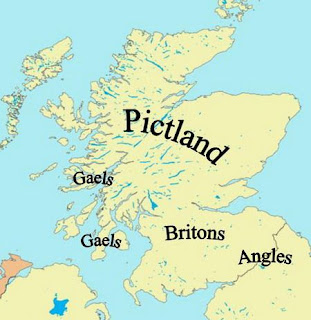Welsh Britonic
Central and Southern Scotland
Place names rooted in Welsh
Many place names in central and southern Scotland are derived from British, the language very close to Welsh which was spoken by the Northern Britons, Glasgow, originally Glasgau, means the green hollow in Britonic.
Edinburgh first appears in Welsh sources as the fort of Din Eidyn. When the Bernicians took over they translated this into English as Edinburgh.
Lanark Lanerc: the clearing (Welsh-lanerch).
Peebles-Pebyl: the shielings (Welsh-pebyll).
Partick-Perthec: the copse (Welsh-perth); also the derivation of Perth,
Paisley-Pasaleg a church word based on Basaleg, a Welsh borrowing from Latin-basilica, mother-church.
Penicuik-Pen y gog: cuckoo's headland.
Cramond Caer Amond: the fort on the River Almond.
Moscow-Maes coll: Hazelfield (Welsh-maes and coll).
Bathgate-Baeddgoed: Boar-wood (Welsh-baedd and coedi)
Melrose Moelrose: the bald/bare headland.
Ecclefechan: perhaps the little church (Welsh-eglwys bechan)
Many river and stream names have British/Welsh origins, like the Clyde (Clud) and the Ayr (Aeron). Many of these British names simply mean river or water, like Avon and Esk, for instance.
Others are compounded with a colour word: two neighbouring burns in Cunningham are the Glazert (Glas dwr: grey/green water) and the Lugton, originally Lug dwr - shining water.
Some river names have words in front that are recognisably Welsh, like aber, a rivermouth or confluence-Abercorn, Abermilk, Aberlady, Aberlosk.

Comments
Post a Comment